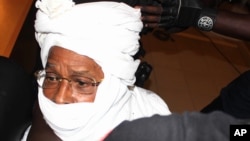They’re silenced, but still screaming, calling for the world to bring their killers to justice.
The cries of the victims of war crimes and mass slayings rise up in places all around the world: Argentina, where Operation Condor slaughtered opponents of the state for 20 years; Rwanda, where ethnic hatreds in the 1990s culminated in tribal-related genocide; Srebrenica, a Bosnian town where Muslim men and boys were killed because of their faith; Somalia, where President Mohamed Siad Barre’s brutality against opponents left countless people dead.
In country after country, as the bones of victims are unearthed, the question of justice is raised. In courtrooms in Africa, The Hague, the United States and elsewhere, the answer is to bring the alleged perpetrators to trial.
In Senegal last month, a war crimes court set up by the African Union sentenced the former president of Chad, Hissene Habre, to life in prison. It was the first time a former national leader had been prosecuted and convicted by the courts of another country for human rights violations.
Rights advocates were jubilant at the sentence. “In a world scarred by a constant stream of atrocities, the ramifications of this verdict are global,” said U.N. High Commissioner for Human Rights Zeid Ra’ad Al Hussein.
Criticism of outcome
In an exclusive interview with VOA, Habre’s attorney, Francois Serres, said he considered the verdict flawed.
“Mr. Habre was already tried, in 2000, in Senegal, [and found not guilty]," he said. "So our position from the beginning was the issue of double jeopardy.” (Double jeopardy refers to a defense against being tried twice for the same offense following a legitimate acquittal or conviction.)
Habre was subjected to proceedings by the AU-connected tribunal in Senegal because of African objections to the International Criminal Court at The Hague, which some contend is too focused on alleged crimes by African leaders.
While the United States signed the Rome Statute that is the legal foundation for the ICC, the U.S. Senate did not ratify it. So the United States is not an active participant in the court.
“There has been a certain amount of informal cooperation between the United States government and the body that oversees the development and operation of the International Criminal Court,” George Washington University law professor Ralph Steinhardt told VOA. “That isn’t to say that the United States is likely to become a party [to the court], although for decades after World War II, the United States was one of the prime movers to create an international criminal court.”
While the United States may not be an active ICC participant, it has had from its first Congress in the 1700s a law called the Alien Tort Statute, which authorizes U.S. courts to hear cases about injuries to foreign nationals that took place overseas. In 1980, a case tried under this statute (Filártiga v. Peña-Irala) effectively enabled foreign citizens to seek and obtain redress in U.S. courts for human rights violations that were committed outside America’s borders.
Somali's case in U.S.
The Alien Tort Statute and another U.S. law, the Torture Victims Protection Act, have been employed in a Washington-area federal civil case against a Somali national accused of war crimes who has been living in the United States for two decades.
The man, Yusuf Abdi Ali, was a military commander during the regime of Somali strongman Mohamed Siad Barre. Survivors in Somalia accuse him of attempted murder and other crimes. Ali has not been formally charged with criminal counts by Somalia or any other nation, so he is being prosecuted under U.S. civil law, where the burden of proof is lower.
The case against Ali is being pursued by the San Francisco-based Center for Justice and Accountability. The lead counsel is Kathy Roberts.
“The Torture Victims Protection Act," Roberts said, "provides a specific course of action, not only to foreigners but also to U.S. citizens, for torture and summary execution.” She said that the law was clearly meant to apply to foreign jurisdictions and that this case, which may go next to the U.S. Supreme Court, makes it clear that while alleged perpetrators can move across borders, the victims of their crimes have a right to justice regardless of where the suspects reside.






